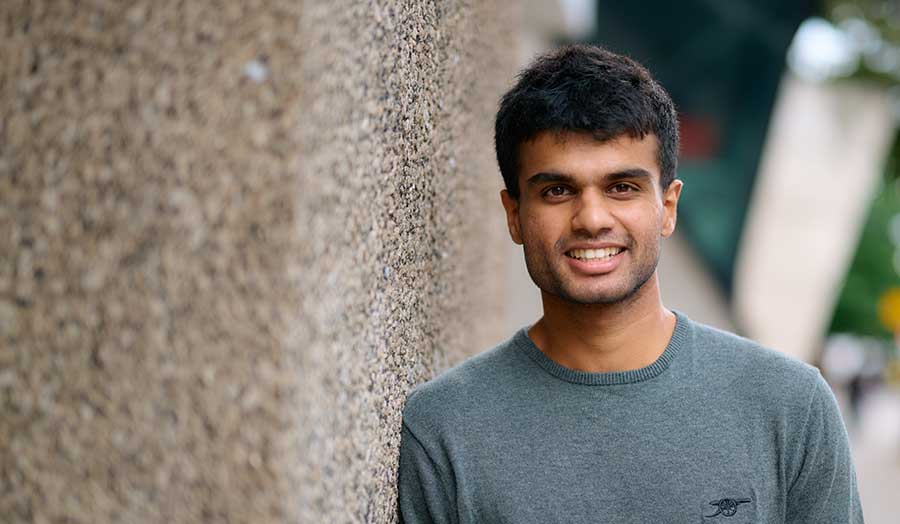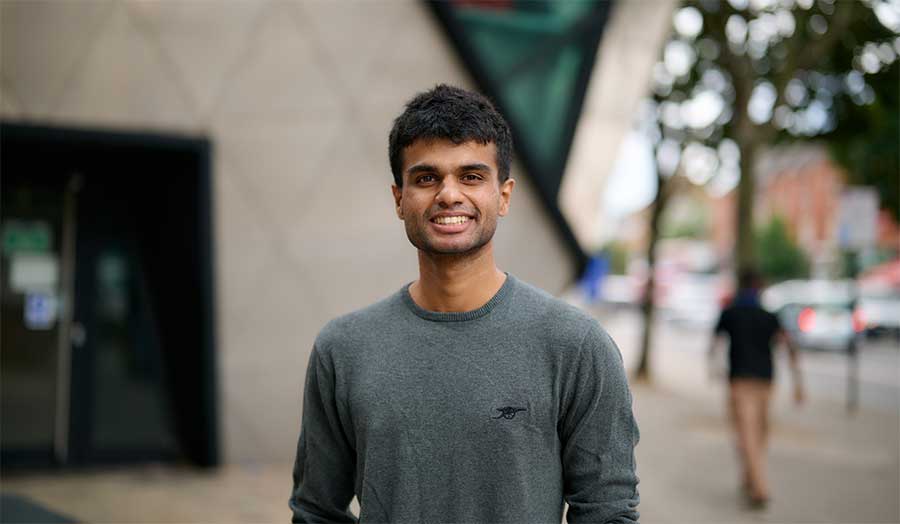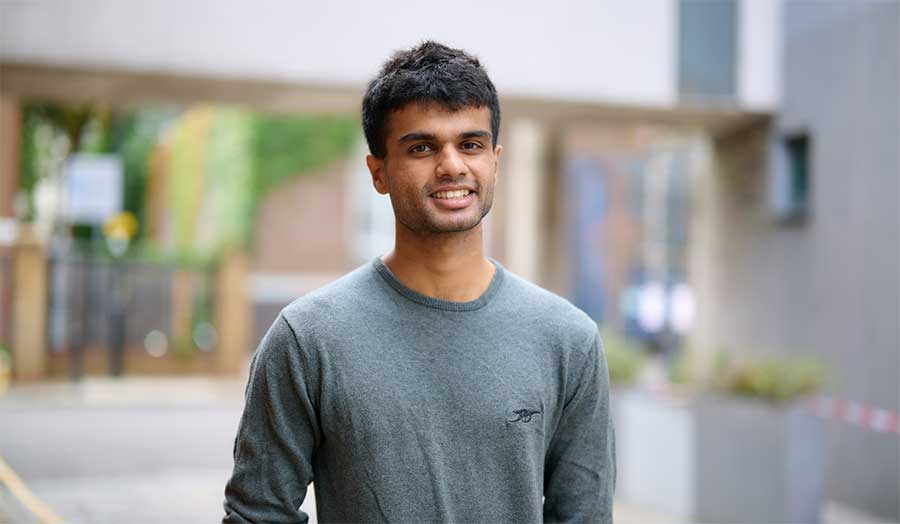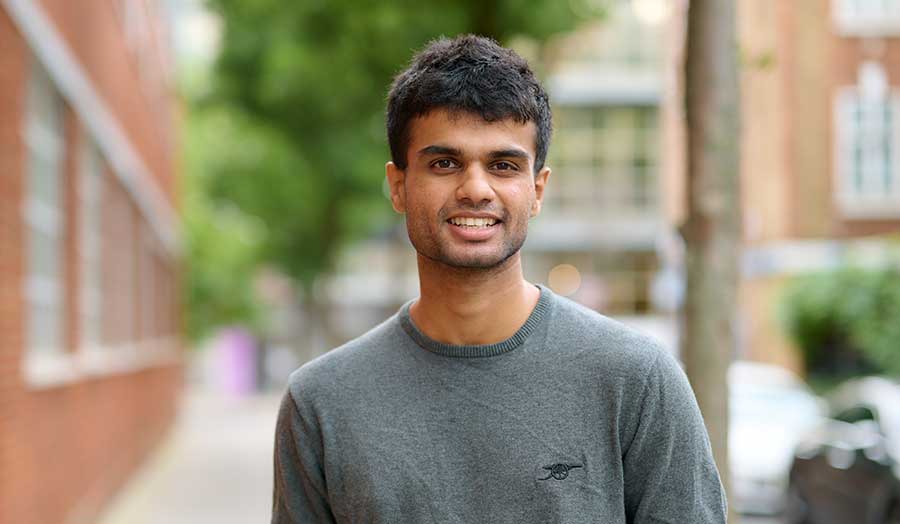If you have diabetes, you could find yourself pricking your skin over 700 times a year to measure your glucose levels, notes London Met PhD researcher and lecturer Renu. Renu is working on a non-invasive sensor solution to this issue, and has come up with some unusual ways to keep himself motivated…
Can you tell us a bit about your background?
I was born and brought up in a city in south India, so I’m used to a city lifestyle. Most of my schooling was in India, and I started my undergraduate degree in robotics in India but towards the end I had an opportunity to go to New York – so I was a researcher over there, and that’s where I developed an interest in doing a PhD. I then did a master’s in robotics at the University of Bristol, and went back to India when Covid hit, and worked in the automation sector for a while.
What made you choose London Met in particular?
I started to apply for PhDs and write to supervisors, and when Professor Bal Virdee replied, I knew he was going to take good care of me – rather than just saying send me your CV or your grades, it was more about what do you want to do and what we can offer, how we can guide you. So that was one of the important reasons why I chose London Met.
Tell us more about your PhD
My PhD is in electronics, more specifically, biosensors. We’re working on a sensor that’s trying to calculate your glucose levels through non-invasive means. You’ve probably seen other methods where you prick your body to measure your glucose levels, mostly intended to help people with diabetes. With our device, we’re intending that you just place it on your hand and it measures your levels from that. There’s much more testing and datasets needed first but hopefully we’re pushing the boundaries.
We had encouraging results from experiments with artificial solutions and published these. We have a collaboration with one of the biggest hospitals in India – they have around 1,000 beds. Last December we went over there to do some clinical trials but it was a humbling experience. It actually proved to us that human bodies are way more complicated and you have to put in more effort – so it helped myself and Innocent (who’s also working on a hydration sensor in the project). I work more on the programming and classification parts and he works on the hardware parts and design.
Whenever we’ve required funding or specialist equipment, London Met’s tried their hardest to accommodate that. They sponsored us for the trip to India and they have helped us a lot.
We still have a contract with the hospital and we’re able to extend that to continue our research which is a good thing for the University, and means that we have good contacts there for any future projects and clinical trials.
What do you hope the impact of your research will be?
If you have diabetes, often you’ll have to prick yourself twice a day, that’s 720 times a year. That’s hard if you have dry skin, and you might get exposed to germs. There’s also a lot of biomedical waste with the plastic strips that are used. Medical strips have an expiry date because of the chemicals too. So it’s not just about decreasing the plastic waste. With the materials we’re using, we’re trying to make sure that our device costs less than £50. We want to make sure that this technology’s available to the vast majority of people around the world.
What drives you?
My mum’s been in a diabetic condition for 30+ years so I’ve seen the struggles that she’s gone through – so I thought that this research is something I can motivate myself to do.
Coming here from India is like a dream for me. I used to memorise the streets around the Emirates when I was growing up – I’m a massive fan of Arsenal. Now I get to live in one of those streets and work around here. If I went back in time and said to my childhood self that I’d be here now, I’d be jumping over the moon.
One of my incentives is that if I do something big in research, I reward myself by going to an Arsenal match. If I’m a bit stressed, watching a match just gives me that mental space that I need – even if we win or lose.
Have you found research itself challenging?
I was told that a PhD is a little like a marriage – you get these lovely moments like butterflies in your stomach when things are going your way – but you never know when the happy moments are going to come. Or the frustrating moments too! For me, writing papers is the boring, stressful part, and research is the exciting part – and having those Arsenal games to watch helps me.
When we went to India, we were confident we had a solution, but the results were completely different to what we expected, and that was very challenging. Research is like a gold mine – you just keep digging to find the gold but you don’t know where exactly it is. When you don’t find it and you’re getting lost, that’s when your supervisor’s there to help you try digging in a different area.
The other challenging part for me is managing time, because I teach here full-time and my research is part-time. A lot of lecturers are going through the same thing – they’re doing their PhDs as well, so it’s good that we have this community.
Have you found good support at the University?
My supervisor’s been great. The support comes also from the Research and Postgraduate Office – they keep organising courses for us, like thesis writing classes every week, and make sure we have a proper PhD community. We have a WhatsApp group where we try to help each other. Even students who’ve completed their PhDs are still in the group because they want to help. Getting a PhD’s a beautiful feeling – that’s what they say. Hopefully I’ll get that as well! It’s a really good community that we have at London Met.
Do you have a favourite spot within the University?
My favourite spot in the University are rooms T706 or T707 – because they overlook the Emirates. And the student support room T804 also has a gorgeous view of the Emirates!
Tell us more about your teaching role at the University
I teach a number of topics ranging from robotics and AI to mathematics. I’m part of the Communications Technology research lab – we also try to include master’s students in longer projects and help guide them. Even undergraduates too, to help them get some good content for their CVs.
As well as doing a PhD, I’m also midway through a PG Cert in Teaching and Learning, to help me polish my teaching skills.
What’s the next step after your PhD?
After finishing my PhD, I still see myself teaching at London Met, maybe get to a senior lectureship or even higher. I love teaching – I teach a range of topics.
I’m excited to be teaching on some new modules too – I was consulted on their development. One of them is AI for Robotics – I really want to make sure that when my students are completing the course, it will be like they’ve already had a year of industry experience.
I’m going to teach them a specific software framework in the field of robotics called robot operating system (ROS) which is the industry standard. The challenge for me is to make sure it’s future-proof and the students are able to adapt to new developments.
What are your tips for other research students?
Try to make the best use of all the resources available. It’s a growing university with a lot of opportunities, lots of part-time teaching roles, and success coaches who can help prepare you for a teaching role if you’re interested in becoming a teacher.
If you’re struggling, don’t stay quiet, trying reaching out to the Research and Postgraduate Office, they’re there to help you. And try to interact with this great student community that we have.

"Research is like a gold mine – you just keep digging to find the gold but you don’t know where exactly it is. When you don’t find it and you’re getting lost, that’s when your supervisor’s there to help you try digging in a different area."
Read more about our PhD courses



